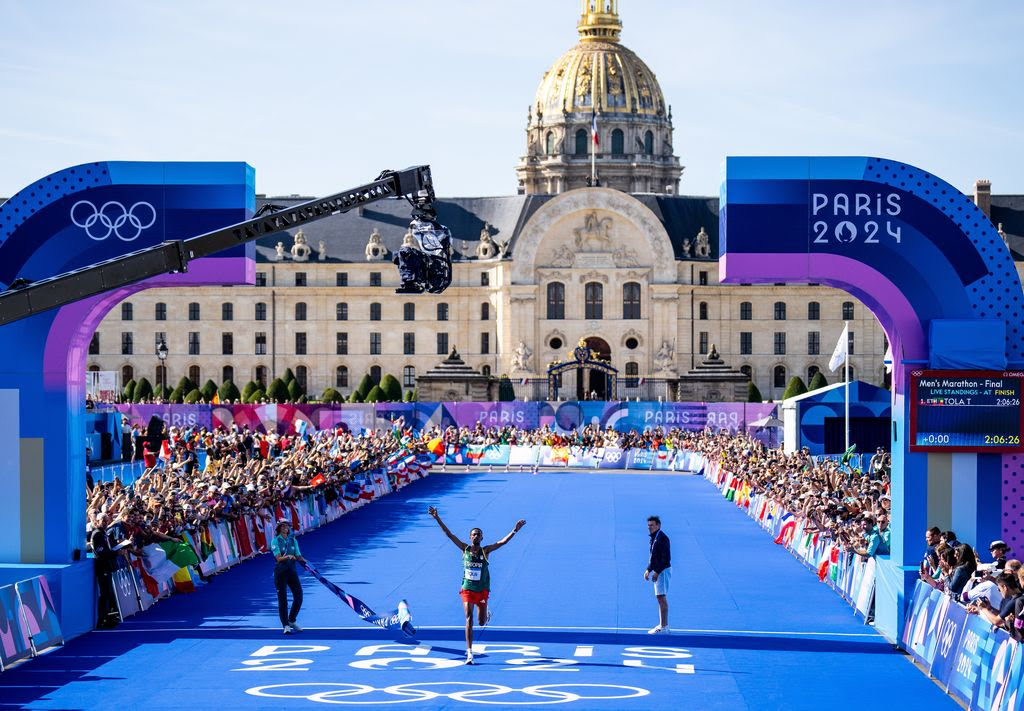In a moment that stunned the world, Eliud Kipchoge, the undisputed king of marathon running, took an unexpected exit from the Olympic stage in Paris. The two-time Olympic gold medalist, revered for his unparalleled consistency and determination, found himself facing a challenge he couldn’t overcome. In what he described as his “worst marathon,” Kipchoge made the heart-wrenching decision to step off the course after 31 kilometers, marking the end of an era.
Table of Contents
Toggle
At 39 years old, Kipchoge entered the race with hopes of making history by securing a third consecutive Olympic gold. But as the miles ticked by, it became clear that this day was not his. Despite being in the leading pack early on, Kipchoge began to fall behind, eventually slipping a minute behind the frontrunners by the halfway point. The discomfort around his waist, which he later revealed, forced him to make a decision that no athlete ever wants to make.
As he slowed down, Kipchoge made a gesture that will be remembered forever—he handed his shoes, socks, and bib to the cheering fans along the roadside, a symbolic passing of the torch from a legend to the people who have supported him throughout his career. The crowd’s applause was deafening as he climbed into an Olympic van, marking perhaps the last time we’ll see the Kenyan superstar on the Olympic stage.

“This is my worst marathon. I have never done a DNF (did not finish). That’s life,” Kipchoge admitted with the grace and humility that has defined his career. “Like a boxer, I have been knocked down, I have won, I have come second, eighth, 10th, fifth – now I did not finish. That’s life.”
Kipchoge’s decision to bow out was a somber reminder that even the greatest athletes are not immune to the challenges of the sport. Yet, in typical Kipchoge fashion, he remained optimistic about the future, even if it means leaving the Olympic track behind. “You will see me in a different way, maybe giving people motivation, but I will not run,” he said when asked about his plans for the Los Angeles 2028 Games.
As the Olympic van carried him away, Kipchoge’s legacy was already cemented—not just as the only man to win the Olympic marathon twice, but as the athlete who redefined what it means to push the limits of human endurance. His record-breaking sub-two-hour marathon, although unofficial, stands as a testament to his extraordinary talent and unyielding spirit.

Ethiopian Tamirat Tola ultimately claimed gold with an Olympic record time of 2:06:26, a remarkable achievement that added another chapter to the rich history of Olympic marathons. But the spotlight, as always, lingered on Kipchoge—a legend who, even in defeat, inspired millions around the world.
As Kipchoge steps back to reflect on his 21 years of running at the highest level, one thing is certain: his impact on the sport will resonate for generations to come. “I need to evolve and feature in other things,” he said, hinting at a future that, while uncertain, promises to be as impactful as his illustrious running career.
Eliud Kipchoge’s Olympic journey may have come to an end, but his influence on the world of marathon running will endure, reminding us all that greatness is not just about victories, but about how one faces the toughest moments.


